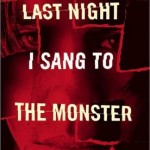Interview by J.L. Powers
Poet and novelist Benjamin Alire Sáenz—recently named by Poets and Writers as one of the world’s most inspiring writers—just brought out his sixth collection of poetry, The Book of What Remains (Copper Canyon Press, 2010). Fellow writer and El Pasoan Jessica Powers recently spoke to him about his latest book of poetry, miracles, pain, anger, the desert, and the U.S.-Mexico border.
POWERS: You are both a poet and a novelist. For you, what’s the impetus to write poetry versus the impetus to write novels?
SÁENZ: I think of everybody as a writer in a certain sense. We create narratives to make sense of something. And sometimes we take those narratives to another place, a novel or even a story because there is an impetus in us to respond and make sense of something. We do the same thing with poetry but it’s more fractured. We’re not telling the whole story in a poem. We’re just letting pieces rise to the surface. When I write a poem, I want to reflect upon something but I don’t want to pretend a totalizing narrative. It’s almost a meditation in one sitting, one intense moment, a singular thought. Or my poems are all these disjointed thoughts and I’m trying to tie those disjointed thoughts together. You might call it a serious exercise in associative thinking.
POWERS: One of the things I noticed in this work of poems, and in your most recent novel, Last Night I Sang to the Monster, is the theme of miracles. I’d like you to talk about miracles, about why they’re dominating your work right now.
SÁENZ: I hadn’t expected that question. I believe, unfortunately, that we too often live our lives in fear. The miracle happens when we stop being afraid of the pain. The journey of my life has taken me to this place, where I’ve stopped being afraid. And it’s been so painful….but it’s also been so freeing. Ultimately it’s never a done deal. You have to continually confront. It’s a miracle that you would start confronting not just your own demons, but everything in the world, a miracle to say, “I will think about this. I will!” It’s difficult to really confront a life. And once you start doing it, it’s incredible. It is miraculous.
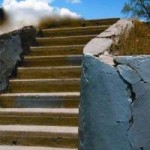 POWERS: You have this line in “After the Dying”: “Their brokenness had made them saints” (p. 74). It seems like your concept of miracles is not some pie-in-the-sky, flash-of-lightning transformed person—but it’s a sense in which flawed human beings are the miracle.
POWERS: You have this line in “After the Dying”: “Their brokenness had made them saints” (p. 74). It seems like your concept of miracles is not some pie-in-the-sky, flash-of-lightning transformed person—but it’s a sense in which flawed human beings are the miracle.
SÁENZ: Yes. I think flawed human beings are the miracle. We just don’t know it. I was really amazed when I was in therapy. The therapists I worked with—and I worked with several—were totally wounded healers. And that moved me. They were able to be empathetic in bringing just the right kind of balance when working with other people. How do you begin to be an empathetic human being? I think it begins with learning to forgive yourself. And I don’t mean in a way that says, “Oh what I did is fine.” I mean that real profound knowledge that you have hurt other people, and that hurt is real—and you have also hurt yourself, and that’s real too—and there is no getting around it except for really looking at the whole mess. In Last Night I Sang to the Monster, there’s a scene where the therapist tells Zach [the protagonist], “I see you, Zach. I see you.” So the next step is that we have to see yourself for what we are. It isn’t to torment yourself but it’s to really see yourself, and then to forgive yourself. The awareness of my own pain has made me a more compassionate human being. And it’s made me a better poet, and a better writer. I like to say that I write because I’m trying to understand the human condition, to photograph the human condition. I think about dealing with my own brokenness, my own humanity, but also the brokenness and humanity of the world.
POWERS: In the poem “What I Have to Sing About,” you talk about looking at humanity, and you juxtapose pain with beauty: “There is no escaping the pain. There is no escaping the beauty./God, I’ve never been this happy. You still want to know what I have to sing/ about?”
SÁENZ: We avoid beauty, too, don’t we? I don’t live in joy all of the time, of course not, but there are moments of joy. In my past life, I think it appeared that I was in love with life, but I was too afraid of it in many ways. And it had to do with my self-hatred, with my inability to deal with a great many personal issues in my life. It’s not as if I didn’t know they were there. I didn’t have amnesia—I’m not Zach—I remember! But that didn’t mean I was dealing with anything. We often think that we’ve dealt with things when we are in a state of profound denial, and I would say that’s emblematic of the world we live in. Look at our inability to deal with the environment, at what’s happening in the Gulf Coast. Is it changing our minds about the way we do business? No. We think, ‘Let’s just clean the mess up so we can continue living the way that we’re living.” No! No! Change means that the future will not look like the past. That is a very radical statement because we only know the past. We don’t know how to create new paradigms. When you’ve really changed, you can’t go back. Not only do you not want to go back, but you’ve become incapable of living the life you’ve led. And this not only on an individual level, but on a societal level.
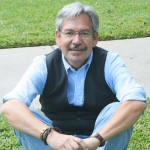 POWERS: Within these poems, the memory of what was lost is strong but there’s still a lot of joy.
POWERS: Within these poems, the memory of what was lost is strong but there’s still a lot of joy.
SÁENZ: I like to explore the question of violence, the question of hatred, the question of love, the question of our inability to deal with the heart of the matter. I think that it’s my way of getting at an idea of grace that’s not cheap. A lived grace. I’m an ex-Catholic priest. I don’t want to hear all the clichés about grace. I’m tired of them. I’ve heard them all. I know them by heart. I want to talk about a lived reality that respects the human being and doesn’t have to frame it theologically. One of my issues with religion is that religion talks about the idea of the beauty of the incarnation—that God would become a man. But in reality, there’s ultimately no respect for human beings, no respect for a human condition that is so fragile, that is so incredibly violent. I don’t believe that we need God to heal us. I think we have it in us to heal each other. Maybe that’s taking the whole theology of incarnation to the extreme but I’m perfectly comfortable with that.
POWERS: There’s another paradox in these poems: in addition to this possibility of miracles, there’s a deep strain of anger—anger at the injustices in the world, for those of us who live both literally at the border but also on the borders of society, anger at the establishment and the status quo.
SÁENZ: One of the things I don’t like about some political poetry is that it’s just a pose. It’s moralistic. And my rage is totally internal. It’s mine. It’s mine. It’s really deep within me. I don’t think it’s healthy to live in anger. It blinds us. But I have to acknowledge my rage, that it’s there. We should be outraged by a lot of things. It’s really interesting to see the Tea Partiers, they are so enraged. And I’m enraged at them because they haven’t ever thought about their own rage, not really. It’s just a reaction. Rage can’t be just a reaction. It can’t just be this thing that wants to hurt. Tea Partiers don’t want to heal anything. They just want to lash out. I’m tired of that. I don’t want to hurt. I just want us to stop hurting each other. A lot of my work is about this thing in me that says, “Basta! When are we going to stop?” In Dreaming the End of War (Copper Canyon, 2006), one of my poems says, “Let me say this again, again. I want this war to end, to end. I want this war to end.” We’re so addicted to fighting each other. We can’t see each other, at all. It angers me that a boy can get killed on the border by the Border Patrol. He doesn’t have to be angel for me to be enraged at that. He can be a very troubled youth, and a troublemaker. But he doesn’t deserve to get killed. That’s not how we should deal with things. I live on the border and it’s my home. We look at the border as a violent place, and we think of Mexicans as violent, and we demonize Mexicans. We demonize people who are undocumented, and we call them illegals, which is a bad word, a name, and we make them into criminals, and we become afraid of them, and they are no longer human beings, and then we can kill them and we can hate them. It enrages me that we are fighting a war against some of the poorest people on earth. Well, good for us. We should be so proud.
This is my home. It’s not a dangerous place. El Paso is one of the safest places to live in the country. Overall, the border is not an easy place to live but it’s not this barbaric, uninhabitable space. People always ask me (I put that in a poem), “You live in El Paso?” And everything in me wants to say, “Fuck you. Fuck you. You live in fucking San Francisco. Who the fuck do you think you are?” I love San Francisco, actually, I do, it’s a great town. Every place is great. I’m tired of people putting down the border and the desert. Where do they get off? Oh, we talk about the earth and the landscape but when we think about the desert, all we think about is absence, the absence of life—but there is so much life in the desert! I have incredible respect for the creatures of the desert. Do you know how much it has cost us to stay alive? I quote Franz Fanon in the first poem in The Book of What Remains: “Every effort is made to bring the colonized person to admit the inferiority of his culture.” People want me to admit the inferiority of the border, the inferiority of the city in which I live, the inferiority of the desert landscape. And I don’t have a kind response to that. I will not admit to inferiority. You want to know why we hate ourselves? Because the rest of the world hates us and we internalize that hate. I’ve stopped hating myself. I’ve stopped hating the city in which I live, and I’ve stopped hating the desert. I’ve embraced my landscape and now I am in love. Please stop asking me why I live in El Paso
POWERS: You love it yet you see it. You see the problems here.
SÁENZ: Yes. But I’m not in denial about who and what we are. I am not the Chamber of Commerce. I see this place in all its beautiful squalor!
POWERS: A few years ago, we were on a panel together at the Reforma conference, and I said, “There’s grace here [at the border] because people know what it’s like to fail and then get back up and try again.” You don’t find that in a lot of places. You find that where immigrants live. You find that with people who have “exile written on their backs,” as you said in the poem, “Last Summer in the Garden.” Failure is everywhere here, and you have to acknowledge that, but people are still living. It’s cost them a lot, but it’s beautiful.
SÁENZ: Some people don’t even understand the failure. They call it success. We think NAFTA is a success? We think a globalized economy is a success? We have to figure this out. We can’t un-globalize the world. We can’t retreat into nationalism. So how do we figure this out so it doesn’t kill the poor, which is exactly what’s happening. That’s what’s happening in Juárez, Mexico. NAFTA has impoverished Mexico. It hasn’t worked. Why is acceptable to keep people poor?
POWERS: What about that concept of exile? It’s in more than just this book.
SÁENZ: It’s in all my work. The whole idea of belonging is very strong in any community. The discourse of belonging, of community, is both religious and nationalistic: that we are a country, that we are a nation, that we must hold together, that we must come together. There are also counter discourses to it—that I can do whatever I want because American individualism matters more, the rights of the individual matter more than this sense of community. I believe we all want to belong, and if we feel rejected, we’ll find a community that will accept us. Even in school, the goths find the goths, the student council types find the student council types, the druggies find the druggies. Everyone finds their own community. Each little community rejects other little communities. And when we grow up, we keep right on doing the same thing. We use the discourse of “us” and “them,” which is actually what happened in the last election. They used it against Obama—he’s not one of us. This was the message: “We know who Amreica belongs to. It belongs to us and we know who we are and we know who they are. They’re the interlopers.” We manage to chase people off the land, we exile them, rather than saying, “Okay, we disagree. How is it we belong to each other?” We won’t do that. We send Mexicans back—we literally exile them. Or we do that to gay people. The army does it to soldiers who are really sick and we don’t know what to do with them. Look at the suicide rate among returned soldiers. Does the military deal with post-traumatic issues? We go around saying, “Thank a soldier.” Yeah, and when they have issues, we throw them away. We’re not helping our soldiers. We’re not even diagnosing them. These are our sons. These are our children.
POWERS: We want war to be very cheap.
SÁENZ: We want everything to be cheap. We’re not equipped to be inclusive. We are constantly exiling people. And then sometimes we’re exiled. The whole story of Adam and Eve—I love that story. It’s a story of shame, of having to leave and learning to become human because you were once perfect. It’s such a rich story that looks at humanity and our relationships to the earth and to each other. If you’re deeply ashamed, sometimes, the psychology becomes not only that you hate yourself but you hate others because you can’t come to grips with your own shame.
POWERS: In one of your poems, you say, “We’re all living in exile, it’s just that some of us don’t know it.”
SÁENZ: Yes. I think that’s true.
POWERS: Is it possible to get beyond exile? Can we escape it?
SÁENZ: We can. But it’s difficult to break those patterns. To break the pattern means that you are capable of pure love. Imagine that!
POWERS: Talking about grace—within your poems, there are moments of it, pockets of it, within a sea of the concept of exile.
SÁENZ: There are moments of freedom. You can’t exist in purity. You can’t live in a pure rage and those that do are supremely unhappy people. And it’s very difficult to sustain pure joy. I hate to use this example but it’s like, “Really? You want to live in orgasm all the time? Wow! Maybe it wouldn’t feel so good if you were always in that state!” You can’t live that intensely in any one emotion, in any one kind of state. You can’t always be calm. Imagine being Zen all the time. Those moments are important because they’re always ephemeral. But we repeat them. So perhaps what my poetry is doing—right now, anyway—is being mimetic with those emotions and trying to articulate them in different contexts. My meditations on the desert are my most Zen poems because they are true meditations—they may evoke an emotion but they’re not emotional.
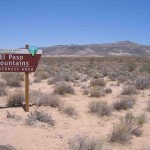 POWERS: Getting back to those desert meditations in this book, I love the last line of your book. You end with this image of your death on the hottest day in the desert so you can make everybody miserable. And yet, “If I am not allowed to smile after I’m dead/then I want to live forever. But only if I can continue living in the desert.” And you have another line, elsewhere, where you say you want everyone to live in the desert.
POWERS: Getting back to those desert meditations in this book, I love the last line of your book. You end with this image of your death on the hottest day in the desert so you can make everybody miserable. And yet, “If I am not allowed to smile after I’m dead/then I want to live forever. But only if I can continue living in the desert.” And you have another line, elsewhere, where you say you want everyone to live in the desert.
SÁENZ: I wasn’t being flip with that. I’m quite serious. We have this illusion that we can have our little piece of Eden and we’re fine. I can really relate to the Bible in this sense: it has a desert landscape. I grew up in the desert, so I see it. I’m very grateful for the desert. The desert is a place of encounter. You encounter your demons and your God. You encounter yourself. You lose yourself and you find yourself. And when you go out to the desert to pray, it’s so you can have an encounter, a necessary encounter, a life-changing encounter. That’s what the desert is for. It’s a place where you can no longer have any illusions, at all. And we have too many illusions. If we turned the whole world into a desert—which we plan to do, by the way—then where will our illusions about ourselves be? Will we keep telling ourselves that we love the earth? I’m not so sure.
In writing this book, I sometimes thought that I didn’t want to write the same kinds of poems I had written before. I didn’t want to write a book where I started parodying myself, thematically or aesthetically. There are so many people who fight over what poetry is. With this book, I’m re-defining what poetry is for me. And I know what being a poet isn’t for me. It isn’t being the dispenser of wisdom. The poet as prophet? Not me. Not now. The poet as a singer, that kind of lyrical troubadour, the beautiful language? There is a rhythm in my work and who doesn’t want their work to sound beautiful, but at the expense of what? I don’t want to aestheticize to anesthetize. I’m not interested in just singing a beautiful song. It’s been said that we write for people that are more or less like us. I can’t imagine sitting down and writing a poem and thinking, “I want everyone to like this poem even Rush Limbaugh.” That’s ridiculous. All poets write their work out of some kind of center, and sometimes that center is so “other” to a reader that they just don’t like it. When I wrote my first couple books of poems, I wanted to be considered a real poet. I really cared. I wanted people to say, “That guy’s a poet.” And now, frankly, I don’t give a flying fuck. I think of myself as a serious writer. If you don’t like my aesthetic and what I’m trying to do, you can move on, and that’s okay with me. How many people read poetry? So I have a couple hundred readers. They’re my readers. Okay! [Laughs] I’m enjoying myself. I’m not that needy guy anymore.
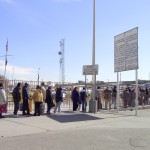 POWERS: You mentioned how every poet writes from a center, but I also think from a particular place. And you clearly do that—you write from El Paso. A lot of your readers are going to be people who understand this place, or who want to understand it.
POWERS: You mentioned how every poet writes from a center, but I also think from a particular place. And you clearly do that—you write from El Paso. A lot of your readers are going to be people who understand this place, or who want to understand it.
SÁENZ: I’m very involved in my space. Right now, I live in troubled times. There are things happening on the border and this is my home. I’m not going to turn a blind eye to it. I am an artist and I am a citizen. If I’m not a citizen first, how can I be a writer? How dare I want a readership if I’m not committed to the polis? Why should the polis have any commitment to me? So I am trying to figure out, like so many other people, what is going on in this wretched and beloved space of El Paso-Juarez. I want to see it, love it, loathe it, understand it, but not walk away from it. To ignore it in my art is to ignore my life. I can’t. I won’t. It’s my air, it’s my home, it’s my space, it’s my heart. I can’t imagine living anywhere else. I can’t imagine wanting to live anywhere else. [Laughs.] “You live in El Paso?”
POWERS: They don’t know what they’re missing!
SÁENZ: All writers have sense of space. When place and our obsessions, plus our particular linguistic quirks—when all of that comes together, that’s where our art comes from. I struggle when I write but I love the struggle. I’m in it. I am in this. For keeps. This is real for me. Writing a poem is real for me. It matters to me. I want it to matter to somebody else. And no-one can ever say about my work that it’s about nothing. It’s not art for art’s sake. I love art, I love literature, but it’s got to be about something. I decided that literature is about giving a voice to the struggle. I’m not the first one to have thought of that, and I won’t be the last. It’s interesting how some people really do abhor political poetry. I don’t know how to write anything else. It doesn’t mean my work is just a rant. It’s much more than that. You have to be willing to take the risk—this is the aesthetic you choose, this is the subject matter, this is it. You have to commit yourself to it. And I have. I have committed myself to my work. And I’m deadly serious about it. The idea of playing with language is offensive. Language is a very dangerous toy to play with. It’s not a toy. It can be a weapon. And it’s not just a vehicle of communication. Language is a way of thinking, an ideology. Imagine living without language? A civilization without language? A political system without language? An economics without language? Language is a necessity. Jokes are necessary but jokes are serious because we need them to survive—that’s serious! Comics are so necessary. I can sit and laugh at some comics but I also understand that their comedy is about survival. How can that be a toy?
